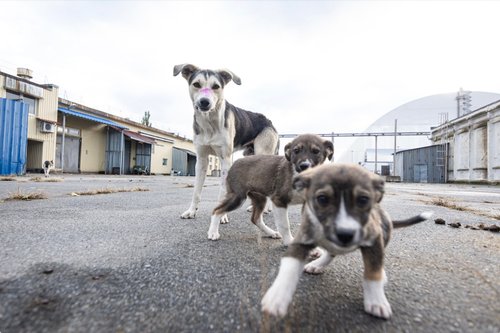“But what about the jobs?”: Environmentalists vs. Industrial Workers
Apr 29, 2021
8 mins


Photographe chez Welcome to the Jungle

Climate change & environment writer
“But what about the jobs?” You’re likely to have heard this response to calls for the phasing out of coal, oil, and gas and the greening of industries. It’s a question that often brings labor unions and environmental groups head to head, but when did protecting workers and the environment become a zero-sum game?
Anabella Rosemberg sits at the meeting point of these two movements. She is the international program director of Greenpeace International having previously spent 15 years in the labor movement as an adviser at the International Trade Union Confederation. We sat down with her to talk about the Catch-22 that isn’t.
What does the workers vs. environment dilemma consist of?
The dilemma revolves around the challenge between moving faster and further towards protecting our environment and the situation of workers today. It is a fact that we have millions of people embarked on a production model that is on a collision course with the ability of human beings to stay on planet earth. For those people, right now, there is that job or no job.
The way in which our governments and the corporate world have decided to deal with this is to oppose the need for protecting the environment and the immediate needs of workers. They present it as having to pick a priority, as if those two are the only possible options, and the priority cannot imply leaving people without an income. What the dilemma shows is the total, utter inability of our decision-makers to think about the future and to accompany workers in a different direction. It is a false dilemma, it is not a Catch-22. It is only presented that way, and it comes from the lack of ambition of our decision-makers.
If it is a false dilemma, why has it gained ground?
One of the things I have seen over the years, both working with labor unions and now in environmental groups, is how easy it is for people working on both these ends to fall into that trap. Environmental organizations end up saying, “We have no time to deal with social matters. We have an urgency here,” whereas unions end up claiming that they cannot think about the future because they need to put workers first—their rights, their needs, and how to put food on their tables.
Thus, unions are often being used by their employers to defend the indefensible, and the greens are being used by a very neo-liberal section of society to attack the needs of workers. We need to figure out a way in which unions can embrace the need for changing the production system that responds to workers’ needs as well. And the green space needs to realize that unless we care about people, there’s no way we can shift power.
What the dilemma shows is the total, utter inability of our decision-makers to think about the future and to accompany workers in a different direction.
What does reality look like from the perspective of workers and environmentalists?
We will never be able to show an alternative future without the people who currently exist: their families, their contexts. We need to figure out what these people want and we need to bust our own myths. Greenpeace is trying to figure out just that: what do workers think about this dilemma? That is why we went to Scotland to ask offshore oil workers what they think about the climate urgency, their jobs, and their future. We didn’t think we were going to get much response, but more than 3,000 workers filled in the survey, and hundreds agreed to be called and share their thoughts with Greenpeace.
In the survey, 81.7% of the oil workers said that if they were offered a job in the renewable energy industry, they were more than happy to go there. They didn’t even consider themselves as oil workers; they were “ocean-going workers”.
We need to figure out a way in which unions can embrace the need for changing the production system that responds to workers’ needs as well. And the green space needs to realize that unless we care about people, there’s no way we can shift power.
In the environmental movement, we need to challenge ourselves to go and listen before making big assumptions of what those workers want. The unions also have a responsibility to go and talk as well. It is really important that we start being open to this conversation and then from there, build our demands on governments instead of taking workers for our natural enemies because they are not.
The rhetoric of those who don’t want to make any progress on environmental issues always goes back to talking about jobs—they can no longer openly defend profits. Some 30 years ago, they could claim that growth was top priority, but the narrative of, “Well, if it’s not good business, we cannot do climate”, is no longer accepted.
Now they have to use a social angle because people don’t trust corporations or governments. So they end up weaponizing workers. As a result, this jobs vs. environment narrative becomes absorbed by many people in the social space.
What’s the history behind the tension between unions and environmentalists?
There was a key moment where for the first time we saw that job losses were going to be used to weaponize environmental ambitions: the Kyoto Protocol in 1992. The US refused to sign it. The key message was: “We are not going to surrender our jobs, there is an opposition and we choose American jobs.”
That approach has stayed, although other perspectives have emerged to challenge it. There is the green jobs narrative, which presents a win-win scenario, and there is the Just Transition narrative, which doesn’t shy away from the fact that there is a challenge, but is prepared to plan for it and be forward-thinking.
We need to challenge ourselves to go and listen before making big assumptions of what those workers want. The unions also have a responsibility to go and talk as well.
In the past 10 years, we thought that we were somehow moving away from this dilemma. But then many right-wing, climate-skeptic governments got into power. That’s not only Trump and Bolsonaro, but also governments that are not considered as extreme. If France wants to keep building airports, that is extremism without calling it such. In Argentina, where I’m from, the environmental movement has been called dumb because it is denouncing the proliferation of oil all over the place.
Today, we are in the strangest war, one that is using the vulnerability of workers during Covid times. This narrative is using that fear to say, “Well, we cannot change everything so fast. We have to keep doing what we were doing before this crisis and the environment is for later when we get in a better position.” But we will not be in a better position later. That’s the thing our political class is just not seeing, or has too many vested interests to act on it.
In many ways you’re the embodiment of these two movements. Drawing from your past experience and observations from the ground, what have been some of the ways in which trade unions have stepped in and called for all parties to meet in the middle?
Unions have often positioned themselves on the right side of history, even when the immediate interests of the workers were not protected. I will always remember the first time I talked to the South African trade unionists when they shared their history with asbestos. This deadly product can kill someone just by inhalation. There was an asbestos production unit in South Africa and the unions came to understand that this was going to kill the workers, and eventually the entire village. So the union went to talk to the workers to encourage them to put their foot down and negotiate a phase-out.
Many people, in particular, the ones who aren’t close to the union movement or familiar with working-class history, tend to take the unions as this body of people that only thinks about the now. In reality, the union movement has fought against apartheid, for justice for women, for equality and for a lot of values that are the only protection for some people. I’m saying this because I think we are sometimes very tough on what we ask unions to do. In Spain, unions have sat at the table to plan and negotiate the most ambitious coal phase-out that exists today. Of course, this is not an easy road, especially when you are often considered to be betraying your workers on the one hand, and as not ambitious enough by environmental groups on the other. Unions are in that very tough spot of trying to get the best for the people they represent while also fighting for the common good.
We need more humility when we’re talking about workers and unions and we need to look at where they are coming from.
We should not be asking unions to do what governments should be doing, which is to set a direction. Unions have to sit at the table to try and figure out how to accompany the workers. Governments need to set ambition levels.
Nonetheless, I’ve seen huge expressions of courage in the union movement over the years, from rank and file too. I once went to northern Argentina to visit the unions there. This region’s economic model is essentially based on logging. I was asked to talk about sustainability and the connection between work and the environment. At the end of the workshop, the head of the local union came to me and said: “A few weeks ago, with all the workers in the logging company, we decided to go to the management and ask them to shut down and to pay us.”
The workers had realized that they were many, that thus they were strong, and that they could therefore fight for a much better exit out of this industry. They knew that in three years there will be no more trees and, coincidentally, no more jobs. So they realized that it was much better to exit from this destructive practice now.
We need more humility when we’re talking about workers and unions and we need to really look at where they are coming from. When you’re from a well-educated, middle-class background—where most of the environmental movement comes from—it’s easy to lecture working people on how to think about the environment.
As the IPD of Greenpeace, you are now spearheading part of the response from the environmental movement. How do you see it stepping forward to meet the labor movement?
There are multiple coalitions, campaigns, and conversations happening between actors like Greenpeace and the labor movement as critical stakeholders for the climate justice campaign. That’s the case in France, with the Plus Jamais Ça coalition that led to Greenpeace standing in a picket line with workers from oil giant Total, who were denouncing greenwashing in their own company. These examples might look anecdotal, but in the background, there is a lot of conversation and alignment happening on the deeper changes that we want to see in society. One of the shifts taking place on the environmental side is that there is less focus on the things that make the two movements disagree, and more effort to build on the values that we do share and use them as a starting point.
There is a lot of work that we need to do with our supporters to help them connect the dots as well. A lot of them come to Greenpeace with a deep commitment for environmental protection. Our duty now is to walk them into the connection with those other struggles. Our role is to radicalize the mainstream, not to talk to the convinced. So we need to tell the stories that are going to make people understand there is a link between inequalities and the way in which we act against climate. We want to make people see that we might want to think about the future of work if we really want to tackle the climate crisis.
In my home country, we might need to think about our development and economic models if we really care about the penguins. If we care about the trees, the best way to protect them might not necessarily be only a tree-hugger, it might also be to challenge the current system that is based on commodity exports.
We need to tell the stories that are going to make people understand there is a link between inequalities and the way in which we act against climate.
It’s certainly difficult and it requires a lot of internal change at Greenpeace. I talk with a lot of love and respect for my previous job, but this one is without doubt the most challenging and at times daunting responsibility. We are 3,000 colleagues around the world, and we’re trying to change the system, to protect the planet and people. It’s huge. I’m very proud to be part of the crazy group that is trying to do it.
Photo: Welcome to the Jungle
Follow Welcome to the Jungle on Facebook, LinkedIn, and Instagram, and subscribe to our newsletter to get our latest articles every day!

More inspiration: Working for the planet

The ‘passion tax’ animal welfare workers are expected to pay
Workers in welfare and rescue organizations, zoos, and veterinary say their love for animals is often exploited, leading to burnout and high turnover
Mar 04, 2024

Healthcare industry emissions are a problem, but doctors can help
Medical professionals are working to address the greenhouse gas impact of their industry, from changing clinic practices to...
Feb 05, 2024

Here’s how to make work safer as climate change worsens heat stress
As though climate change didn't pose enough challenges, rising temperatures are also sapping workers' productivity and health
Aug 23, 2023

Sorting the green from the greenwashed: How sustainable is your employer?
A majority of Americans care about corporate sustainability. But how do you know if your company is walking its climate talk?
Mar 27, 2023

The wild dogs of Chernobyl: the story of the pups born on radioactive wasteland
What happened to the animals left behind after the nuclear disaster in Ukraine, and who are the people helping them?
Nov 16, 2022
The newsletter that does the job
Want to keep up with the latest articles? Twice a week you can receive stories, jobs, and tips in your inbox.

Looking for your next job?
Over 200,000 people have found a job with Welcome to the Jungle.
Explore jobs


